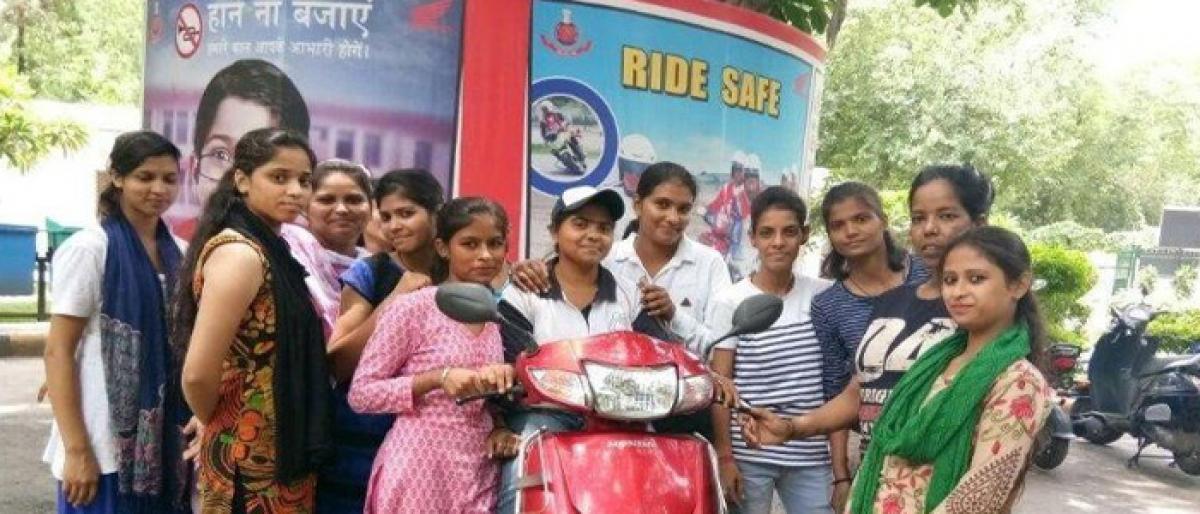Live
- Telugu Desam Party Gains Support in Cheepurupalli Constituency as 500 Families Join from YCP"
- Meta AI: New WhatsApp and Instagram AI Chatbot; Availability and Features
- Four of the same family murdered
- Minister Kottu Satyanarayana pledges support for businessmen in Tadepalligudem
- YSR Congress MLA candidate B.S. Maqbool urges voters to support CM Jagan's efforts in education sector
- Secunderabad Cantonment Congress MLA Candidate Sri Ganesh Campaign in Vaddera Basti and Loya Nagar
- "Yarlagadda promises special measures to tackle unemployment in Gannavaram constituency"
- Adari Anand Kumar, YCP MLA Candidate, Urges Supporters to Work for Party's Success
- ‘Aranmanai 4’ release postponed: New date announced
- Senior Leaders Declare Support for TDP Candidate Somireddy in Sarvepalli Constituency
Just In

It was a vision of Yogesh Kumar, the founder of Even Cargo, to ensure that women in our country are treated equally when it comes to the matter of employment. He never gave up though there were many hurdles that came up in his endeavour but took them as a challenge and moved on with his vision
It was a vision of Yogesh Kumar, the founder of Even Cargo, to ensure that women in our country are treated equally when it comes to the matter of employment. He never gave up though there were many hurdles that came up in his endeavour but took them as a challenge and moved on with his vision. He conducted workshops that were above the common feminist ways and trained women to the best of their ability.
Excerpts:
What was the idea behind starting Even Cargo?
Even Cargo was started with a vision to create a gender harmonious world where everyone will have an equal opportunity to earn their livelihood irrespective of their gender. It is a social enterprise that employs women from resource-poor communities and provides them with job opportunity as women delivery personnel. Our focus is to overcome the barriers of unemployment through skill development of women to increase the participation of women workforce in labour market.
What was the inspiration to start this organisation?
Inequality and disparity were responsible for my decision to start Delhi OYE first and then Even Cargo. Many of my experiences made me start this initiative. I would say it's not the privilege but the shame that I as a male would live with every day seeing the other gender struggling on a day-to-day basis to lead a dignified life. When we started Delhi OYE as a pilot project in March 2014, our aim was to make public spaces safer for women.
We developed an online platform to register the cases which generally go unnoticed. But then our aim wasn't just to get them registered on our platform, we wanted police to become an important stakeholder. We engaged with them for over a year, we wanted them to come onboard and take cognizance of these offences. But for many reasons, it didn't work out. Observing a long time that the government process takes its own time, we decided to start engaging youth and children in our mission to build gender awareness. For two years we worked with students from different schools, colleges and transport personnel to build awareness around gender and violence against women. We were able to reach out to over 1,200 people in almost three years with our workshops and activities.
We observed that most of these workshops are conducted in GKs, Panchseels, Safdarjungs, etc. People from these areas have their own need, nobody is denying that. But we saw not many people are going to a Badarpur or a Badli to conduct these activities and workshops. So, we decided to do that. While doing so we realised that people who are finding it hard to make their ends meet, it’s very unfair on our part to expect them to understand gender as a concept. Then we decided to empower these women by training them in various skills and then generating employment.
We purposely decided not to skill them on stitching or cooking which are associated with feminine gender generally. We wanted to make a statement through our action so we decided to start women cab service, which didn’t work out due to various factors. The whole purpose of starting this venture was to empower women to reclaim their share of public space. Then we started with Even Cargo, Logistics service.
How many employees work with Even Cargo?
We have around 15 delivery girls and three staff members who work for Even Cargo.
What challenges did you face?
There were many obstacles. Major was to convince parents of the employees to allow their girls to take up jobs in Even Cargo. The problem of mindset and attitude of people towards women is the major one. Team building and finances was another problem to pin down, but we have been able to manage that with the help of TISS-DBS social venture initiative and Singapore International Foundation.
The biggest challenges that we still face is that of societal acceptance. Majority of people still feel uneasy seeing such initiatives. We have seen the mindset changing, however small it may be, but yes, we are seeing positive change in our environment. Another major challenge was to identify these girls and then instilling confidence in them. Though finances still remain one of the worry points, we have been able to manage it.
Any plans to venture into other parts of the country?
Yes, we are planning to scale our services in Hyderabad and Mumbai in the next three months.

© 2024 Hyderabad Media House Limited/The Hans India. All rights reserved. Powered by hocalwire.com







